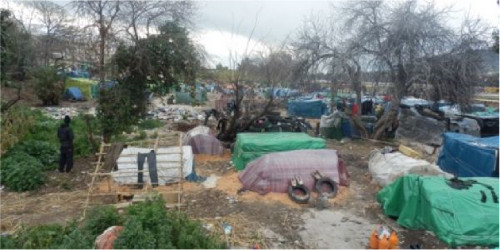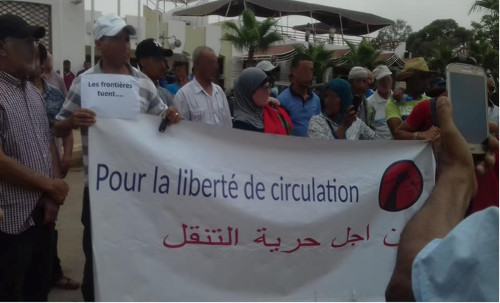
While favourable weather conditions play a part in the upsurge in people leaving for Spain, Morocco proves time and again why staying there simply is not an option for many migrants.
Arrests and removals towards the south of the country continue in the border regions, but we have also witnessed attempts far away from the borders that attempt to make the lives of many migrants as difficult as possible. In the evening of the 7th of July, the Moroccan authorities began evicting the camp next to the train station in Fes, which was home to more than 1,700 people. For eight years, the self-organised camp has been a place where people could rest and recover after being deported from the border areas. During the eviction, the police burned tents and personal belongings, stole phones and money, and hundreds of people were deported to Marrakech, Beni-Mellal, Agadir and Essaouira in more than ten busses.
The Moroccan authorities have, since the end of 2017, made it known that they wished to evict the camp in Fes, but promised to find alternative solutions for the people living there. However, no solution has been proposed to all the people who have been forcefully evicted from their homes.1

Targeted by measures of the Moroccan authorities to reinforce migration control are also minors of Moroccan origin who try to enter mainland Spain via the colonies Ceuta and Melilla. Raids and arrests in the border zones of the colonies are frequent, but lately the number of arrests has peaked with 120 minors being arrested in Beni Ansar in the eastern border of Melilla on July 15th alone. According to the authorities, the minors who are between 13 and 18 years of age, were brought back to their hometowns as Tinghir, Zagora or Errachidia in southeast Morocco – but this account could not be confirmed.2 The idea of creating a new centre for these minors which has recently been proposed by Spain has come a long way since it was on the agenda of the Beni Ansar communal council meeting held on February 1st. The local government of Melilla has announced that it is ready to finance this project with up to 8 million Euro.3 The Association Marocaine des Droits Humains (AMDH) considers this project a maneuver on the part of the Spanish authorities to outsource the responsibility for the minors to Morocco, while discarding their responsibility to guarantee their rights as mandated by international agreements and national legislation.4
Political developments
The new Spanish government has promised to improve the situation at Spain’s southern borders. Amongst others, the Spanish president Pedro Sanchez announced that he would work toward taking down the barbed wire covering the fences between Morocco and Ceuta and Melilla.5 On 28th of June, the Spanish interior minister Fernando Grande-Marlaska visited his counterpart Abdelouafi Latfit in Rabat in order to discuss – among others – the illegalized migration movements from Morocco to Spain.6 The ministers announced that the concertina barbed wire will only be removed if the ‘security’ at the common border can be assured alternatively. The idea of :: detention centers in countries of origin and transit has been widely discussed in the last weeks within the EU, but this idea was rejected by the Moroccan foreign minister Naser Burita, who announced after the meeting with the Grande-Marlaska that Morocco ‘rejects and will always reject’ those kind of centers as they appear to be an ‘easy solution’ for the EU, externalizing the ‘problem’ but not addressing it.7 Further developments regarding facilities on Moroccan soil remain to be seen.
Other regional news
In June, the AP News agency reported that Algeria had deported more than 13,000 migrants into the Sahara within the previous 14 months. According to witnesses, they had been left there without water and food, and, in many cases, the authorities had confiscated mobile phones and money. The deported were forced to walk for hours or days at temperatures of up to 48 degrees Celcius to reach the nearest inhabited locations.8 Most of them needed to cross 15 km of plain desert towards the town of Assamaka in Niger. Among the deported are also women and children, some witnesses have reported about pregnant women who lost their babies on the way. Algeria denies any violent and inhumane treatment of the people concerned and does not publish deportation statistics. Radio Canada cites a spokesman for the EU who said that the they were aware of Algeria’s actions, but that “sovereign countries” can expel migrants provided they comply with international law.9
Alarm Phone activists from Oujda as well as other Algerian and Moroccan activists called for a joint march on 22nd of July towards the common border of the two countries, starting from Oujda (Morocco) and at the same time from Maghnia (Algeria). The activists demand to re-open the border that has been closed since 1994.10 They demand freedom of movement and oppose the border externalisation strategies of the EU. This very border crossing between Maghnia and Oujda is one of the most dangerous entries to Morocco for travellers as it is highly secured and consists of deep trenches and a high fence. An open border in this region would be crucial for the travellers to reach Morocco safely and for the struggle for freedom of movement. Every two weeks activists will march now towards the border from Oujda, Morocco, with the next march scheduled for the 5th of August.

Source: Alarm Phone Oujda
Notes
1 :: libe.ma
:: yabiladi.com
2 :: libe.ma
3 :: libe.ma
4 :: libe.ma
5 :: europe1.fr
:: europe1.fr
6 :: mapnews.ma/
7 :: elfarodeceuta.es
8 :: tagesschau.de
9 :: ici.radio-canada.ca
10 :: h24info.ma
Source: From the Sea to the City! Alarm Phone 6 Week Report, 11 June – 22 July 2018, published on 27. July 2018 in :: alarmphone.org




 grenzregime
grenzregime